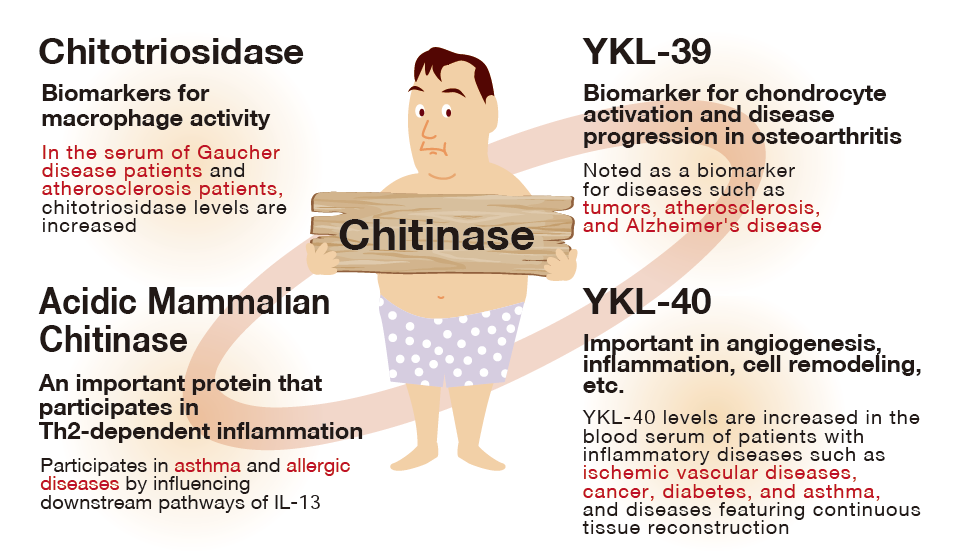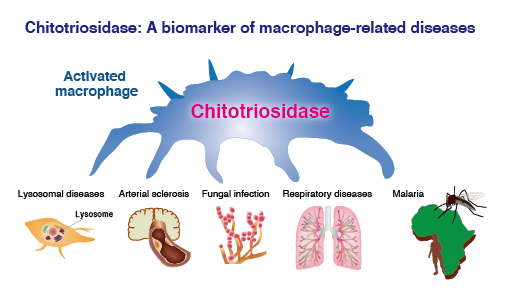Chitinase

Chitin is a β(1→4)-bonded biopolymer of N-acyl-D-glucosamine, and is the main component of exoskeletons and cell walls of various organisms including arthropods, nematodes, and fungi. However, it has not been found in vertebrates.
Chitinase, an enzyme that degrades chitin into oligomers, has been found to exist in a wide range of organisms including vertebrates, and two varieties of chitinase have been identified in mammals.
One of these is chitotriosidase, which is produced by macrophages, and the other is acidic mammalian chitinase (AMCase), which is primarily secreted in the stomach.
Most chitinase-family proteins are found or identified in relation to arthritis, allergies, or parasitic infections accompanied by eosinophilia, and because they have been found to be strongly related to various pathologies, they are gaining attention as excellent biomarkers for understanding pathology.
Chitotriosidase ELISA Kit and Chitotriosidase Fluorometric Assay Kit

Chitotriosidase was discovered in plasma of patients suffering from Gaucher's disease; it was found that
the 1,000-fold-elevated enzyme originates from lipidladen macrophages that accumulate in various tissues
of Gaucher's patients. This enzyme is a human chitinase member of family 18 glycosyl hydrolases, and has the capability to hydrolyze chitin. This enzyme is selectively expressed in activated tissue macrophages that accumulate in various tissues of several lysosomal diseases.
Elevated levels of serum chitotriosidase were also found in disorders caused by the abnormal activation of immune system, including sarcoidosis and atherosclerosis. It has been shown that chitotriosidase activity was elevated up to 55-fold in extracts of atherosclerotic tissue, showing a clear connection between chitotriosidase expression and lipid-laden macrophages inside human atherosclerotic vessel wall.
 CircuLex Human Chitotriosidase ELISA Kit
CircuLex Human Chitotriosidase ELISA Kit
 CycLex® Chitotriosidase Fluorometric Assay Kit
CycLex® Chitotriosidase Fluorometric Assay Kit
Acidic Mammalian Chitinase Fluorometric Assay Kit(Discontinued)
The glycosyl hydrolase family is quite large, with over 100 families. Acidic mammalian chitinase
(AMCase) and chitotriosidase-1 are enzymatically active true chitinases in a member of the glycosyl
hydrolase-18 family, identified by EC 3.2.1.14. In mammals, only these two enzymes cleave
N-acetyl-beta-D-glucosamine (1->4)-beta linkages in chitodextrins and chitin, the second most abundant
biopolymer that can be found in the cell walls of fungi, micro-filarial sheaths of helminths, and
exoskeletons of insects and crustaceans.
AMCase was cloned as an acid-stable active enzyme and is highly expressed in the gastrointestinal
tract, and to a lesser extent, in the lung and alveolar macrophages in both humans and mice, with
an optimum activity at pH 4–5. AMCase as well as chitotriosidase-1 is 50 kDa proteins, consisting of
a 39 kDa catalytic region separated from a chitin-binding domain by a hinge region. They both
show considerable homology to chitinases from lower organisms.
AMCase is one of the important proteins involved in Th2-mediated inflammation and has been
implicated in asthma and allergic diseases by affecting the IL-13 downstream pathway. Inhibition of
AMCase results in decreased airway inflammation and airway hyper-responsiveness in a murine
asthmatic model, suggesting that the AMCase activity is a part of the mechanism of Th2 cytokine-driven
inflammatory response in asthma.
YKL-39 ELISA Kit
YKL-39, also known as chitinase 3-like 2, is secreted chitinase-like protein which contains Glyco_18 domain with no chitinase catalytic activity but with putative lectin properties. In contrast to its closest homologue YKL-40, YKL-39 is not a glycoprotein. YKL-39 is secreted by articular chondrocytes, also synoviocytes and activates signal-regulated kinases ERK1/ERK2 in human embryonic kidney cells. Increased levels of YKL-39 have been demonstrated in synovial fluids of patients with osteoarthritis (OA) or rheumatoid arthritis (RA) as well as in malignant tumors, particularly in glioblastomas. YKL-39 is
currently recognized as a biomarker for the activation of chondrocytes and the progress of the osteoarthritis in human. In addition, autoantibodies to YKL-39 were detected in 8–11.8% of patients with RA, and 11.1% of patients with OA, while only 1% of patients with RA had autoantibodies to YKL-40.
Maturation of monocyte derived macrophages in the presence of Th2 cytokine IL-4 and TGF-beta leads to the strong activation of YKL-39 expression. Thus elevated levels of YKL-39 observed during chronic inflammations can not be attributed solely to the activity of chondrocytes. In perspective, YKL-39 is also proposed as a useful biomarker to detect macrophagespecific response in tumor, atherosclerosis and neurodegenerative diseases including Alzheimer's disease, in addition to the
chondrocyte-specific activation.
 CircuLex Human YKL-39 ELISA Kit
CircuLex Human YKL-39 ELISA Kit
YKL-40 ELISA Kit
YKL-40, also called CHI3L1 (chitinase-3-like-1) and human cartilage glycoprotein-39, is a member of the family of mammalian chitinase-like proteins and is a highly conserved protein. YKL-40 is secreted in vitro by numerous human cancer cell lines of different origin, including glioblastoma, colon cancer, ovarian cancer, prostate cancer, osteosarcoma, malignant melanoma as well as by macrophages and neutrophils. YKL-40 has roles in cell proliferation and differentiation, angiogenesis, inflammation, remodeling of the extracellular matrix, and the innate immune response. This protein also protects against
apoptosis.
Increased plasma YKL-40 concentrations have been seen in patients with diseases characterized by inflammation and ongoing tissue remodeling, such as ischemic cardiovascular diseases, cancer, diabetes, asthma, chronic obstructive pulmonary disease, rheumatoid arthritis, osteoarthritis, atherosclerosis, inflammatory bowel disease, pneumonia and liver fibrosis, where they correlate with disease activity.
 CircuLex Human YKL-40 ELISA Kit
CircuLex Human YKL-40 ELISA Kit
 CircuLex Human YKL-40 ELISA Kit High Sensitivity Version
CircuLex Human YKL-40 ELISA Kit High Sensitivity Version




 PCSK9 ELISA and PCSK9-LDLR in vitro Binding Assay Kits
PCSK9 ELISA and PCSK9-LDLR in vitro Binding Assay Kits